形容词不规则变化
- 格式:ppt
- 大小:176.50 KB
- 文档页数:22
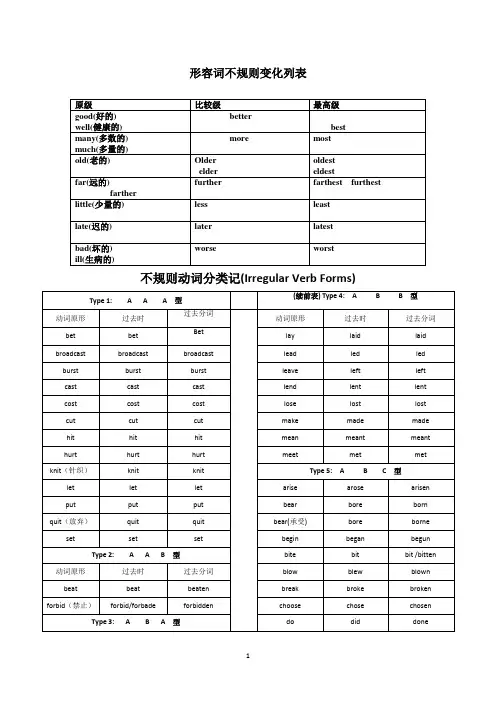
形容词不规则变化列表不规则动词分类记(Irregular Verb Forms)双写结尾的辅音字母,再加-ed的过去式。
如:stop—stopped,trap-trappeddrop-dropped plan-planned refer-referred prefer- preferred fit-fittedbeg-begged nod-nodded permit-permitted admit-admitted shop-shopped双写结尾的辅音字母,再加ing的现在分词如:sitting running getting cutting stopping beginning planning permitting ridding hitting letting shutting setting swimming 双写结尾的辅音字母,再加er的比较级 sad red ~big~hot~wet~fat thin~ 红大热湿胖瘦以不发音的-e 结尾的动词,去-e ,再加-ing。
coming taking firing encircling writingbecoming breathing leaving人称代词,物主代词,反身代词一览表简单句五种基本句型:常见的以ant,ent 结尾的名词: merchant, agent, servant常见的以ar结尾的名词scholar, liar, beggar常见的以ee结尾的名词employee, examinee ,interviewee, trainee常见的以er结尾的名词banker,teacher ,waiter,villager, Londoner, observer常见的以ess结尾的名词actress, hostess, manageress常见的以age结尾的名词courage, storage, marriage shortage常见的以al结尾的名词refusal, arrival, survival, approval常见的以ment结尾的名词treatment, movement, judgment, punishment, argument常见的以ness结尾的名词goodness, kindness, tiredness, friendliness常见的以ship结尾的名词hardship, membership, friendship 常见的以th结尾的名词depth, wealth, truth, length, growth。

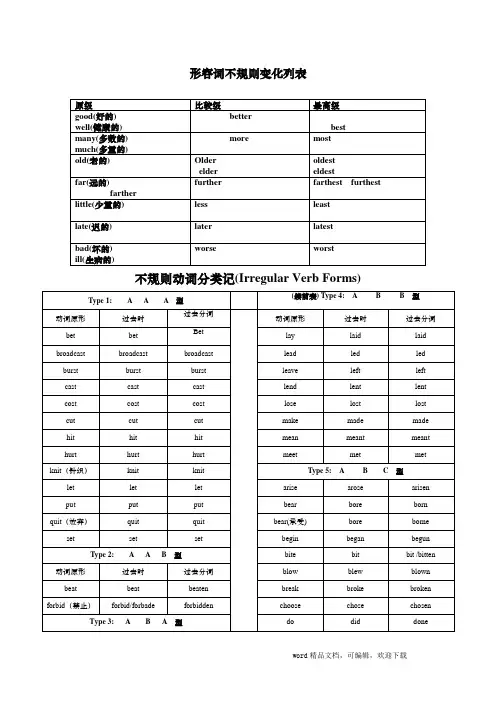
形容词不规则变化列表不规则动词分类记(Irregular Verb Forms)双写结尾的辅音字母,再加-ed的过去式。
如:stop—stopped,trap-trapped drop-dropped plan-planned refer-referred prefer- preferred fit-fitted beg-begged nod-noddedpermit-permitted admit-admitted shop-shopped双写结尾的辅音字母,再加ing的现在分词如:sitting running getting cutting stopping beginning planning permitting ridding hitting letting shutting setting swimming双写结尾的辅音字母,再加er的比较级sad red ~big~hot~wet~fat thin~ 红大热湿胖瘦以不发音的-e 结尾的动词,去-e ,再加-ing。
coming taking firing encircling writing becoming breathing leaving人称代词,物主代词,反身代词一览表简单句五种基本句型:常见的以ant,ent 结尾的名词: merchant, agent, servant常见的以ar结尾的名词scholar, liar, beggar常见的以ee结尾的名词employee, examinee ,interviewee, trainee常见的以er结尾的名词banker,teacher ,waiter,villager, Londoner, observer常见的以ess结尾的名词actress, hostess, manageress常见的以age结尾的名词courage, storage, marriage shortage常见的以al结尾的名词refusal, arrival, survival, approval常见的以ment结尾的名词treatment, movement, judgment, punishment, argument常见的以ness结尾的名词goodness, kindness, tiredness, friendliness常见的以ship结尾的名词hardship, membership, friendship 常见的以th结尾的名词depth, wealth, truth, length, growth。
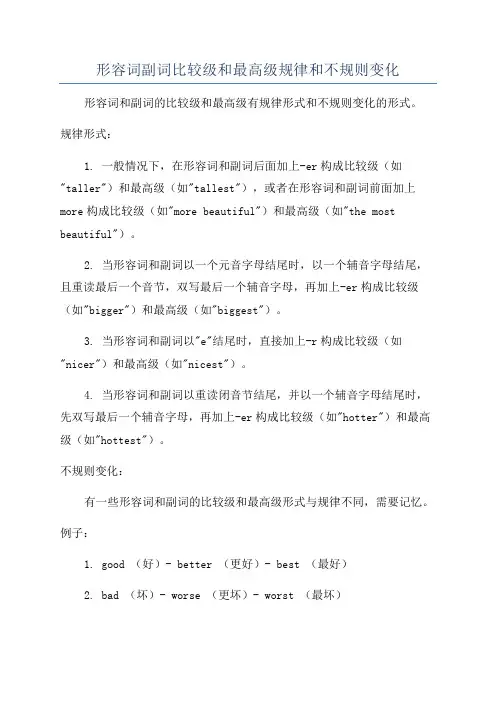
形容词副词比较级和最高级规律和不规则变化形容词和副词的比较级和最高级有规律形式和不规则变化的形式。
规律形式:1. 一般情况下,在形容词和副词后面加上-er构成比较级(如"taller")和最高级(如"tallest"),或者在形容词和副词前面加上more构成比较级(如"more beautiful")和最高级(如"the most beautiful")。
2. 当形容词和副词以一个元音字母结尾时,以一个辅音字母结尾,且重读最后一个音节,双写最后一个辅音字母,再加上-er构成比较级(如"bigger")和最高级(如"biggest")。
3. 当形容词和副词以"e"结尾时,直接加上-r构成比较级(如"nicer")和最高级(如"nicest")。
4. 当形容词和副词以重读闭音节结尾,并以一个辅音字母结尾时,先双写最后一个辅音字母,再加上-er构成比较级(如"hotter")和最高级(如"hottest")。
不规则变化:有一些形容词和副词的比较级和最高级形式与规律不同,需要记忆。
例子:1. good (好)- better (更好)- best (最好)2. bad (坏)- worse (更坏)- worst (最坏)3. far (远)- further/farther (更远)- furthest/farthest (最远)4. many/much (多)- more (更多)- most (最多)5. little (少)- less (更少)- least (最少)6. well (好)- better (更好)- best (最好)7. badly (坏)- worse (更坏)- worst (最坏)需要注意的是,有些形容词和副词只有原级,没有比较级和最高级,如perfect(完美的)、unique(独一无二的)、correct(正确的)等。
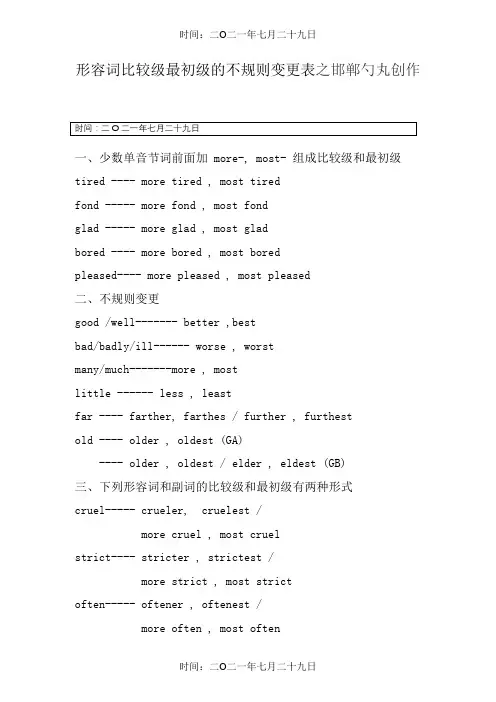
形容词比较级最初级的不规则变更表之邯郸勺丸创作一、少数单音节词前面加 more-, most- 组成比较级和最初级tired ---- more tired , most tiredfond ----- more fond , most fondglad ----- more glad , most gladbored ---- more bored , most boredpleased---- more pleased , most pleased二、不规则变更good /well------- better ,bestbad/badly/ill------ worse , worstmany/much-------more , mostlittle ------ less , leastfar ---- farther, farthes / further , furthestold ---- older , oldest (GA)---- older , oldest / elder , eldest (GB)三、下列形容词和副词的比较级和最初级有两种形式cruel----- crueler, cruelest /more cruel , most cruelstrict---- stricter , strictest /more strict , most strictoften----- oftener , oftenest /more often , most oftenfriendly------ friendlier , friendliest /more friendly , most friendlyclever----- cleverer, cleverest /more clever , most clever四、下列形容词和副词没有比较级和最高(即暗示”最高程度”或”绝对状态”的形容词和副词没有比较级和最初级)empty , wrong , perfect , unique , extreme , excellent , favourite (GB)/ favorite (GA) , true , right , correct , extremely ...。
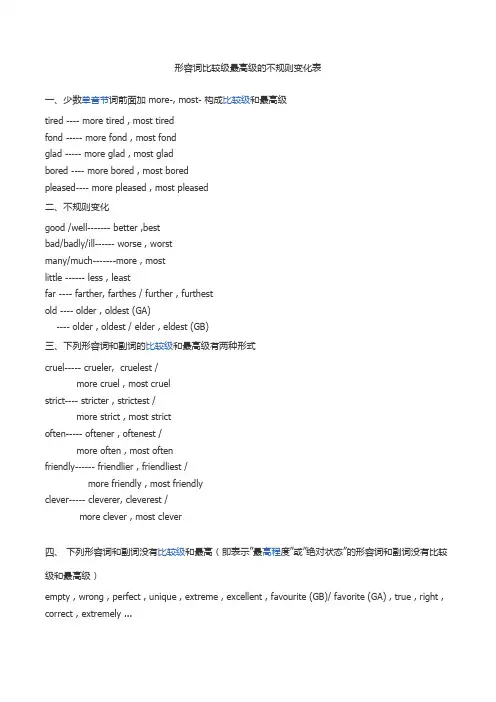
形容词比较级最高级的不规则变化表一、少数单音节词前面加 more-, most- 构成比较级和最高级tired ---- more tired , most tiredfond ----- more fond , most fondglad ----- more glad , most gladbored ---- more bored , most boredpleased---- more pleased , most pleased二、不规则变化good /well------- better ,bestbad/badly/ill------ worse , worstmany/much-------more , mostlittle ------ less , leastfar ---- farther, farthes / further , furthestold ---- older , oldest (GA)---- older , oldest / elder , eldest (GB)三、下列形容词和副词的比较级和最高级有两种形式cruel----- crueler, cruelest /more cruel , most cruelstrict---- stricter , strictest /more strict , most strictoften----- oftener , oftenest /more often , most oftenfriendly------ friendlier , friendliest /more friendly , most friendlyclever----- cleverer, cleverest /more clever , most clever四、下列形容词和副词没有比较级和最高(即表示”最高程度”或”绝对状态”的形容词和副词没有比较级和最高级)empty , wrong , perfect , unique , extreme , excellent , favourite (GB)/ favorite (GA) , true , right , correct , extremely ...。
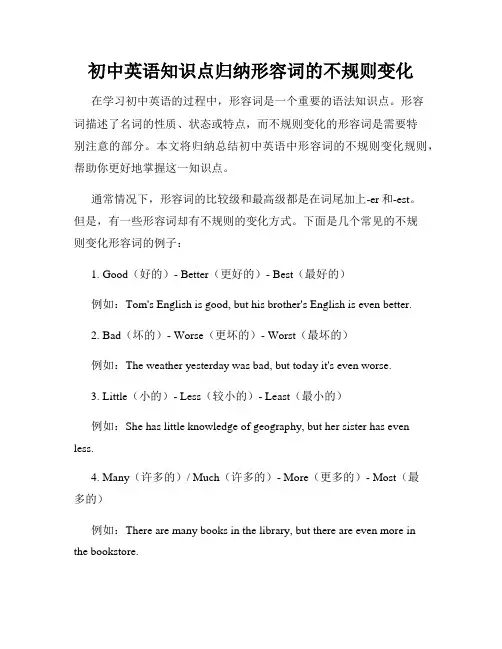
初中英语知识点归纳形容词的不规则变化在学习初中英语的过程中,形容词是一个重要的语法知识点。
形容词描述了名词的性质、状态或特点,而不规则变化的形容词是需要特别注意的部分。
本文将归纳总结初中英语中形容词的不规则变化规则,帮助你更好地掌握这一知识点。
通常情况下,形容词的比较级和最高级都是在词尾加上-er和-est。
但是,有一些形容词却有不规则的变化方式。
下面是几个常见的不规则变化形容词的例子:1. Good(好的)- Better(更好的)- Best(最好的)例如:Tom's English is good, but his brother's English is even better.2. Bad(坏的)- Worse(更坏的)- Worst(最坏的)例如:The weather yesterday was bad, but today it's even worse.3. Little(小的)- Less(较小的)- Least(最小的)例如:She has little knowledge of geography, but her sister has even less.4. Many(许多的)/ Much(许多的)- More(更多的)- Most(最多的)例如:There are many books in the library, but there are even more inthe bookstore.5. Far(远的)- Further/Farther(更远的)- Furthest/Farthest(最远的)例如:The school is far from my house, but the park is even further.需要注意的是,形容词的比较级和最高级前可以加上more或most来表示更高的程度。
除了不规则变化的形容词,还有一些形容词的比较级和最高级是通过在前面加上more和most来构成的。
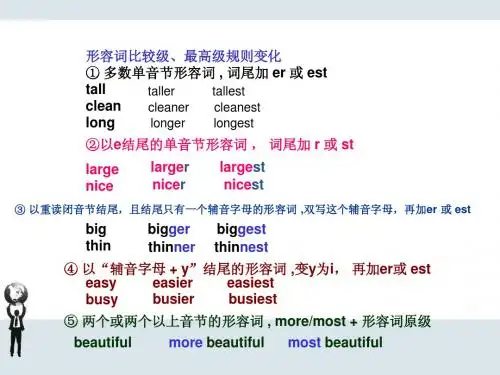
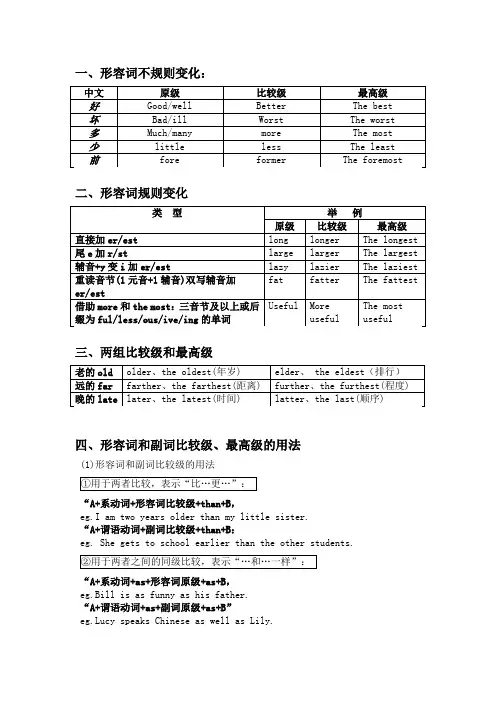
今天的天气比昨天暖和。
This picture is more beautiful than that one.这张照片比那张照片漂亮。
This meeting is less important than that one.这次会议不如那次会议重要。
The sun is much bigger than the moon.太阳比月亮大得多。
形容词最高级的用法:形容词最高级用于两个以上的人和物进行比较, 其结构形式为:主语+谓语(系动词)+the+形容词最高级+名词+表示范围的短语或从句。
She is the best student in her class.她是班上最好的学生。
Shanghai is one of the biggest cities in China.上海是中国最大城市之一。
This is the biggest apple I have ever met.这是我见到的最大的苹果。
Tom is the tallest boy in his basketball team.汤姆是他们篮球队中个子最高的孩子。
几个特殊用法:most 同形容词连用而不用 the,表示 "极,很,非常, 十分"。
It's most dangerous to be here.在这儿太危险。
I cannot do it, it's most difficult.我干不了这件事,太难了。
"The+形容词比较级..., the+形容词比较级..."表示 " 越... 就越..."。
The more you study, the more you know.你学的越多, 就知道的越多。
The more I have, the more I want.我越有就越想要有。
The more, the better.越多越好。
" 形容词比较级 + and + 形容词比较级 ", 表示 " 越来越... "。
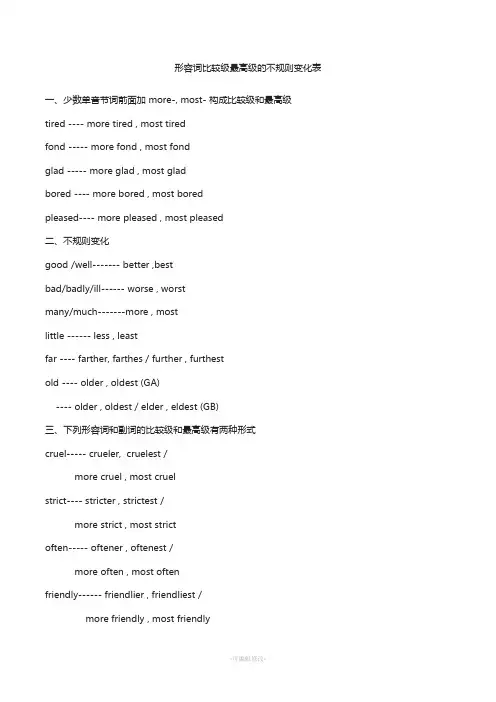
形容词比较级最高级的不规则变化表一、少数单音节词前面加 more-, most- 构成比较级和最高级tired ---- more tired , most tiredfond ----- more fond , most fondglad ----- more glad , most gladbored ---- more bored , most boredpleased---- more pleased , most pleased二、不规则变化good /well------- better ,bestbad/badly/ill------ worse , worstmany/much-------more , mostlittle ------ less , leastfar ---- farther, farthes / further , furthestold ---- older , oldest (GA)---- older , oldest / elder , eldest (GB)三、下列形容词和副词的比较级和最高级有两种形式cruel----- crueler, cruelest /more cruel , most cruelstrict---- stricter , strictest /more strict , most strictoften----- oftener , oftenest /more often , most oftenfriendly------ friendlier , friendliest /more friendly , most friendlyclever----- cleverer, cleverest /more clever , most clever四、下列形容词和副词没有比较级和最高(即表示”最高程度”或”绝对状态”的形容词和副词没有比较级和最高级)empty , wrong , perfect , unique , extreme , excellent , favourite (GB)/ favorite (GA) , true , right , correct , extremely ...THANKS致力为企业和个人提供合同协议,策划案计划书,学习课件等等打造全网一站式需求欢迎您的下载,资料仅供参考。
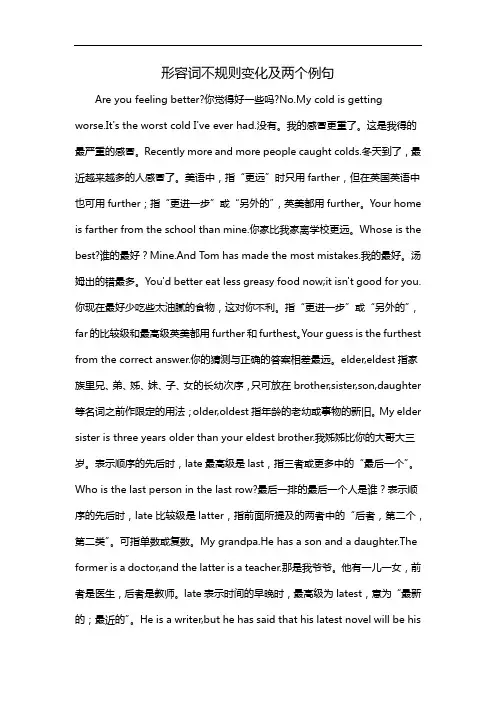
形容词不规则变化及两个例句Are you feeling better?你觉得好一些吗?No.My cold is getting worse.It's the worst cold I've ever had.没有。
我的感冒更重了。
这是我得的最严重的感冒。
Recently more and more people caught colds.冬天到了,最近越来越多的人感冒了。
美语中,指“更远”时只用farther,但在英国英语中也可用further;指“更进一步”或“另外的”,英美都用further。
Your home is farther from the school than mine.你家比我家离学校更远。
Whose is the best?谁的最好?Mine.And Tom has made the most mistakes.我的最好。
汤姆出的错最多。
You'd better eat less greasy food now;it isn't good for you.你现在最好少吃些太油腻的食物,这对你不利。
指“更进一步”或“另外的”,far的比较级和最高级英美都用further和furthest。
Your guess is the furthest from the correct answer.你的猜测与正确的答案相差最远。
elder,eldest指家族里兄、弟、姊、妹、子、女的长幼次序,只可放在brother,sister,son,daughter 等名词之前作限定的用法;older,oldest指年龄的老幼或事物的新旧。
My elder sister is three years older than your eldest brother.我姊姊比你的大哥大三岁。
表示顺序的先后时,late最高级是last,指三者或更多中的“最后一个”。
Who is the last person in the last row?最后一排的最后一个人是谁?表示顺序的先后时,late比较级是latter,指前面所提及的两者中的“后者,第二个,第二类”。
形容词不规则变化列表(总4页)--本页仅作为文档封面,使用时请直接删除即可----内页可以根据需求调整合适字体及大小--形容词不规则变化列表不规则动词分类记(Irregular Verb Forms)双写结尾的辅音字母,再加-ed的过去式。
如:stop—stopped,trap-trapped drop-dropped plan-planned refer-referred prefer- preferred fit-fitted beg-begged nod-nodded permit-permitted admit-admitted shop-shopped双写结尾的辅音字母,再加ing的现在分词如:sitting running getting cutting stopping beginning planning permitting ridding hitting letting shutting setting swimming双写结尾的辅音字母,再加er的比较级 sad red ~big~hot~wet~fat thin~ 红大热湿胖瘦以不发音的-e 结尾的动词,去-e ,再加-ing。
coming taking firing encircling writing becoming breathing leaving人称代词,物主代词,反身代词一览表简单句五种基本句型:常见的以ant,ent 结尾的名词: merchant, agent, servant常见的以ar结尾的名词scholar, liar, beggar常见的以ee结尾的名词employee, examinee ,interviewee, trainee常见的以er结尾的名词banker,teacher ,waiter,villager, Londoner, observer常见的以ess结尾的名词actress, hostess, manageress常见的以age结尾的名词courage, storage, marriage shortage常见的以al结尾的名词refusal, arrival, survival, approval常见的以ment结尾的名词treatment, movement, judgment, punishment, argument常见的以ness结尾的名词goodness, kindness, tiredness, friendliness常见的以ship结尾的名词hardship, membership, friendship 常见的以th结尾的名词depth, wealth, truth, length, growth。